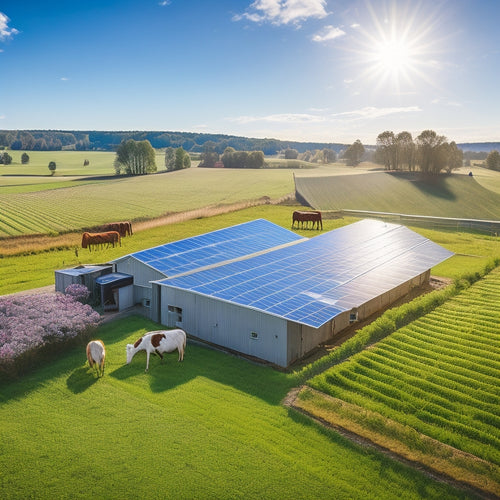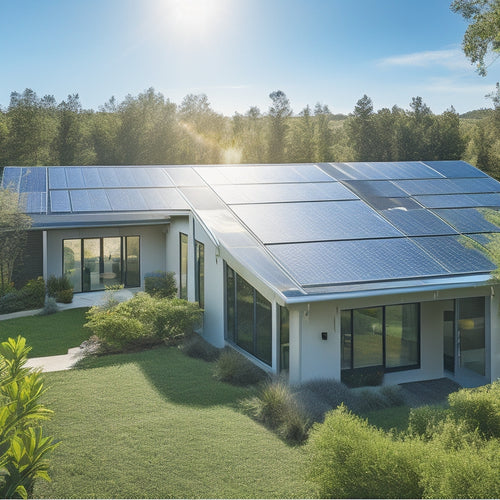
7 Best RV Power Maintenance Tips
Share
To guarantee your RV's power system runs smoothly and safely, you'll want to prioritize maintenance. Start by monitoring your solar panel performance and cleaning the panels regularly to maximize energy output. Next, check electrical connections to prevent corrosion and inspect fuses to avoid system failures. Managing your energy consumption effectively will also help prevent power drain and system instability. Additionally, update your solar panel software, inspect and replace fuses as needed, and perform scheduled system checks to identify potential issues early. By following these essential tips, you'll be well on your way to optimizing your RV's power system - and with a few more tweaks, you'll be running like a pro.
Overview
- Regularly clean solar panels to ensure maximum energy output and monitor their performance to detect issues early.
- Inspect and maintain electrical connections, fuses, and circuit breakers to prevent corrosion and system failures.
- Manage energy consumption effectively by monitoring daily use, prioritizing essential appliances, and adjusting inverter settings.
- Perform scheduled system checks, including battery health and inverter maintenance, to prevent electrical system issues.
- Always follow safety precautions, such as disconnecting power sources and wearing safety gear, when performing maintenance to minimize electrical hazards.
Monitor Solar Panel Performance
When you're relying on solar power to keep your RV's batteries charged, monitoring solar panel performance is crucial to confirm you're getting the most out of your system.
Regular cleaning can improve energy output by up to 25% Regular cleaning importance, and real-time monitoring with smart sensors helps enhance production.
You need to track your solar panel's performance to verify peak solar efficiency. Performance tracking helps you identify any issues that might be affecting your solar panel's ability to generate power.
By regularly checking your solar panel's voltage, current, and power output, you'll be able to detect any problems early on and take corrective action.
This guarantees your RV's batteries are always fully charged, giving you the freedom to camp off-grid without worrying about running out of power.
Clean Panels for Maximum Output
Since dust and debris can greatly reduce your solar panel's energy output, cleaning them regularly is vital to maximize power generation.
You'll want to use gentle cleaning techniques to avoid damaging the solar panel materials. Avoid using harsh chemicals, abrasive materials, or high-pressure washes, which can scratch or discolor the panels.
To guarantee ideal energy output, it's imperative to select solar panels based on wattage required for battery charging and prioritize panel efficiency, as high-efficiency panels generate more power per hour of sunlight, especially in shaded conditions.
Instead, mix a solution of mild soap and water, and use a soft-bristled brush or cloth to wipe away dirt and debris. For more stubborn stains, try using a specialized solar panel cleaning solution.
Regular cleaning will guarantee your panels operate at peak efficiency, giving you the freedom to enjoy your RV excursions without worrying about power outages.
Check Electrical Connections Regularly
You'll want to regularly inspect your RV's electrical connections to prevent corrosion and guarantee secure points of contact.
Corrosion can greatly reduce your system's efficiency, so it's vital to take proactive measures to prevent it.
When selecting solar components, consider evaluating efficiency, durability, and compatibility of solar panels solar regulations and safety standards to provide a reliable energy system.
Corrosion Prevention Methods
Regularly checking electrical connections is an essential corrosion prevention method, as it helps detect and address potential issues before they escalate into major problems. You can take it a step further by applying rust inhibitors or protective coatings to electrical components. These measures will help prevent corrosion from forming in the first place.
| Method | Description |
|---|---|
| Apply rust inhibitors | Spray or brush rust inhibitors onto electrical components to prevent corrosion |
| Use protective coatings | Apply protective coatings, such as silicone or wax-based products, to electrical connections |
| Inspect for corrosion | Regularly inspect electrical connections for signs of corrosion, such as rust or greenish residue |
| Clean electrical connections | Clean electrical connections regularly to prevent dirt and moisture buildup |
Secure Connection Points
Checking electrical connections regularly is vital for maintaining a dependable power supply in your RV, as loose or corroded connections can lead to electrical shocks, fires, or complete system failures.
You'll want to inspect all connection types, including battery terminals, circuit breakers, and electrical plugs. Pay attention to signs of wear, corrosion, or overheating, and take safety precautions when working with electrical systems.
Tighten loose connections, clean corrosion from terminals, and replace damaged components. Consider using protective covers or coatings to prevent future corrosion.
Manage Energy Consumption Effectively
You need to keep a close eye on your daily energy use to prevent power drain and maintain a stable electrical system.
By monitoring your energy consumption, you'll be able to identify areas where you can cut back and prioritize essential appliances.
This will allow you to optimize your power settings and guarantee you're using your RV's power efficiently.
Monitor Daily Energy Use
About 80% of RV owners experience power outages or electrical issues due to inefficient energy management. To avoid being part of this statistic, you need to monitor your daily energy use. This involves tracking your energy consumption to identify usage patterns and make adjustments accordingly. By doing so, you'll be able to optimize your energy usage and reduce the risk of power outages.
| Appliance | Average Daily Usage | Energy Consumption (Watts) |
|---|---|---|
| Refrigerator | 8 hours | 180 |
| Air Conditioner | 4 hours | 600 |
| Laptop | 2 hours | 65 |
| Lights | 6 hours | 120 |
| Water Pump | 1 hour | 40 |
Prioritize Essential Appliances
With your energy usage patterns identified, it's time to prioritize essential appliances to manage energy consumption effectively. You need to determine which appliances are must-haves and which can be sacrificed when energy reserves are low.
Focus on energy efficient appliances that cater to your essential power needs. For instance, if you need to keep your medications refrigerated, prioritize your fridge over non-essential appliances like your TV.
Make a list of your essential appliances and allocate your available power accordingly. This will guarantee you have enough energy to power the appliances that matter most, giving you the freedom to enjoy your RV lifestyle without worrying about running out of power.
Optimize Power Settings
How much power do your appliances really consume? Knowing this is essential for optimizing your RV's power settings.
Take inventory of your appliances' power consumption in watts or amps. This will help you determine which ones to prioritize when managing your energy resources.
Adjust your inverter settings to allocate power efficiently. For example, set your inverter to prioritize charging your batteries during peak sun hours. This will help maintain healthy battery maintenance.
By optimizing your power settings, you'll reduce the risk of power outages and prolong your off-grid excursions.
Take control of your energy consumption and enjoy the freedom to roam without worrying about running out of power.
Update Solar Panel Software
One essential aspect of maintaining your RV's solar panel system is verifying the software that controls it is up-to-date. This is vital to optimize energy production, guarantee seamless integration with other power systems, and enable future solar panel upgrades. Outdated software can lead to reduced efficiency, compatibility issues, and even system failures.
| Software Version | Compatibility | Features |
|---|---|---|
| v1.2 | Compatible with most RV systems | Automatic energy monitoring, customizable settings |
| v1.5 | Compatible with newer RV systems | Advanced energy forecasting, remote software updates |
| v2.0 | Compatible with all RV systems | Enhanced system diagnostics, optimized energy production |
Regularly check the manufacturer's website for software updates and follow their instructions to guarantee a smooth installation process.
Inspect and Replace Fuses
What could be causing your RV's electrical system to malfunction? One common culprit is a blown fuse. You should inspect your fuses regularly to prevent system failures.
Check your owner's manual to determine the fuse location, as it varies by RV model. Look for signs of wear, corrosion, or overheating, which can indicate a blown fuse. You may have different fuse types, such as glass tube or blade fuses, so make certain you have the correct replacements on hand.
When replacing fuses, verify you use the same amperage rating to prevent further damage. Keep in mind that some modern RVs may have circuit breakers instead of fuses, so be certain to check your system before making any repairs.
Perform Scheduled System Checks
Regular fuse inspections can help prevent electrical system failures, but they're just one part of maintaining your RV's power system.
To guarantee your freedom on the open road, you need to perform scheduled system checks. This includes monitoring your battery health by checking the state of charge, voltage, and electrolyte levels.
You should also perform inverter maintenance by inspecting the unit for signs of overheating, corrosion, or physical damage. Additionally, check the inverter's output voltage and frequency to confirm they're within the recommended specifications.
Frequently Asked Questions
How Often Should I Equalize My Rv's Deep Cycle Batteries?
You should equalize your RV's deep cycle batteries every 1-3 months, or when the specific gravity readings vary by 0.030 or more, to guarantee proper battery maintenance and extend their lifespan through the equalization process.
Can I Use Any Type of Cleaner on My Solar Panels?
When cleaning your solar panels, you're not free to use just any cleaner, as harsh chemicals can damage the panels' surface; instead, you'll want to opt for a gentle, specialized solar panel cleaning solution to guarantee peak energy output and maintain their efficiency.
What Is the Ideal Temperature Range for My Rv's Batteries?
You'll want to keep your RV's batteries between 65°F and 75°F to maximize their lifespan, as extreme temperatures can greatly impact performance and longevity, with temperature effects causing premature aging and capacity loss.
How Do I Prevent Rodents From Damaging My Rv's Electrical System?
You're likely among the 20% of RV owners who've had rodent damage; don't let it happen again! Seal all entry points using rodent-proofing techniques, and apply electrical insulation methods like wire wraps and conduit to protect your system from those pesky critters.
Can I Install a Solar Panel System on an Older Rv?
You can install a solar panel system on an older RV, considering factors like roof size, weight capacity, and electrical compatibility. Choose from monocrystalline, polycrystalline, or thin-film solar panel types, and guarantee proper installation considerations, including mounting, wiring, and battery integration.
Ready to Buy
You've made it! You've survived the grueling task of reading about RV power maintenance. Pat yourself on the back, because let's be real, it's a miracle you didn't fall asleep halfway through. But seriously, by following these 7 tips, you'll be the envy of all your fellow RVers who are stuck in the dark ages of battery-draining ignorance. So go ahead, bask in the glory of your newfound electrical knowledge, and remember: a well-maintained RV is a happy RV.
Related Posts
-

What Do I Need to Know About Farm Solar Panels
When considering farm solar panels, you need to assess costs, benefits, and technical specifics. Initial investment c...
-

Top Camping Water Bottles for Adventure
When you're out adventuring, picking the right camping water bottle is essential for staying hydrated. Look for durab...
-

Installing Metal Solar Roofs for Maximum Energy Efficiency
Installing metal solar roofs can drastically enhance your home's energy efficiency and durability. These roofs withst...


